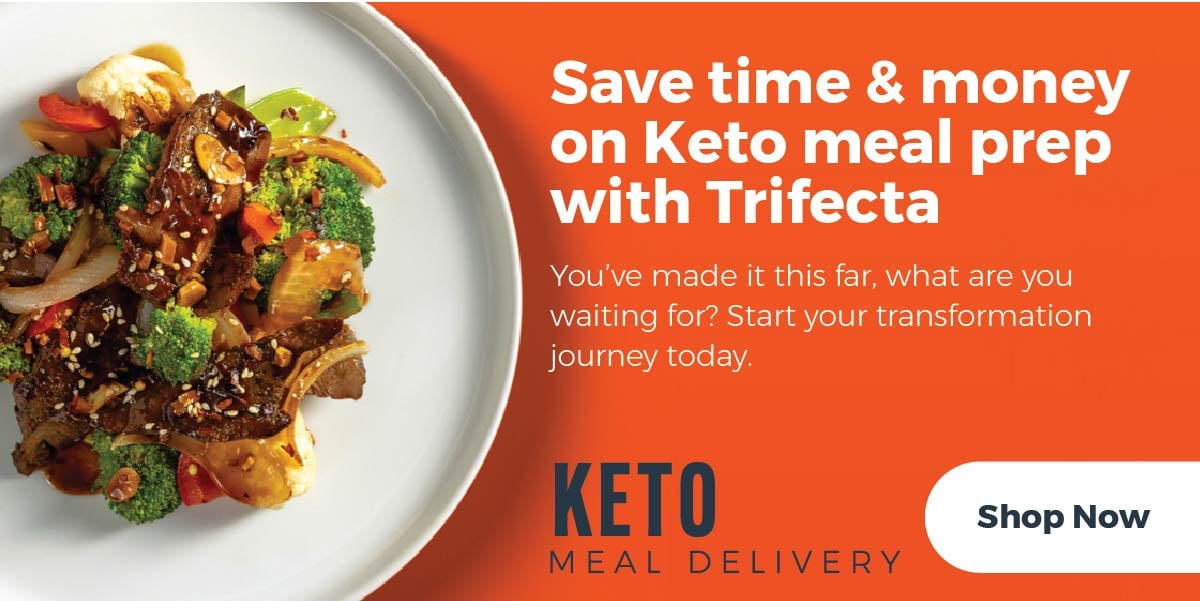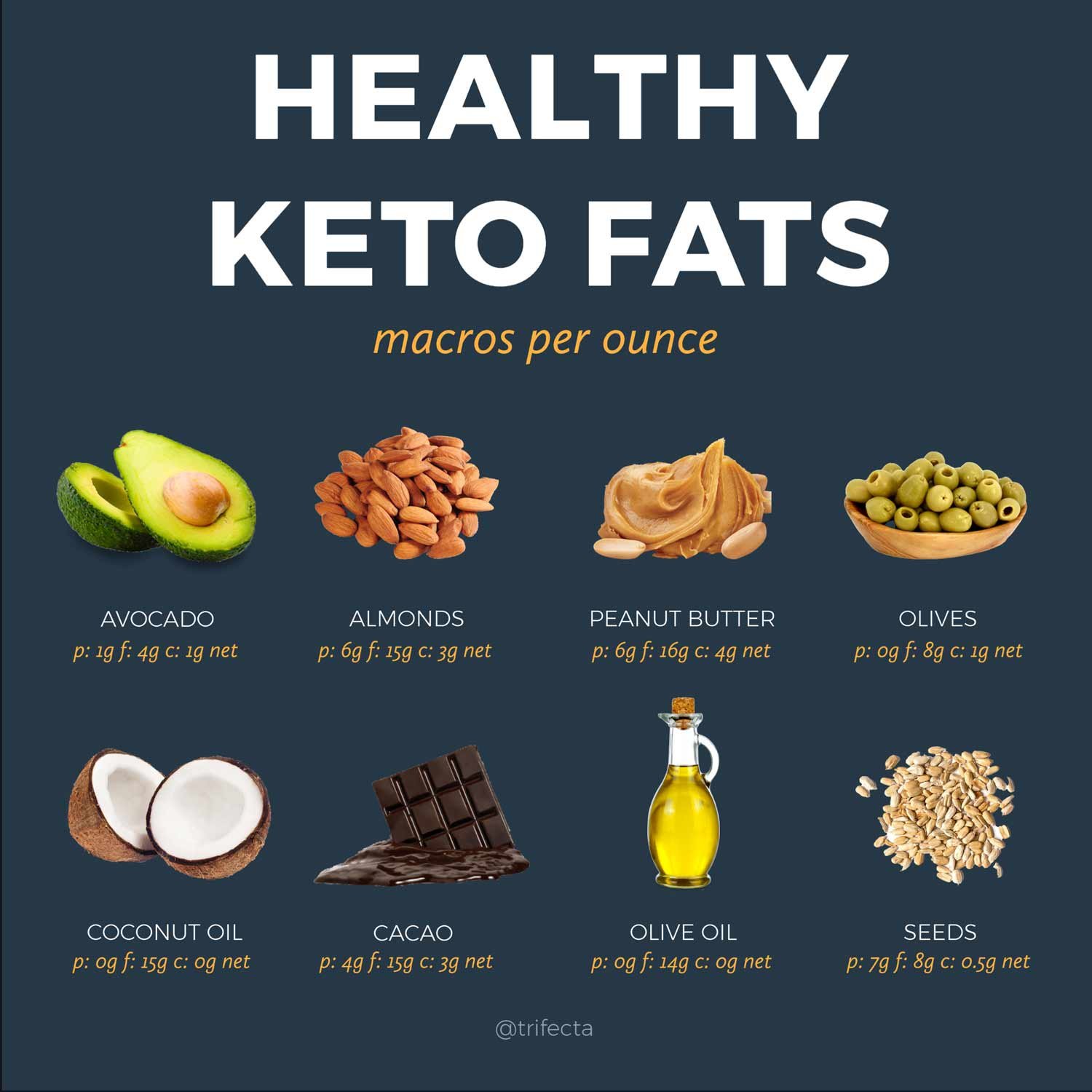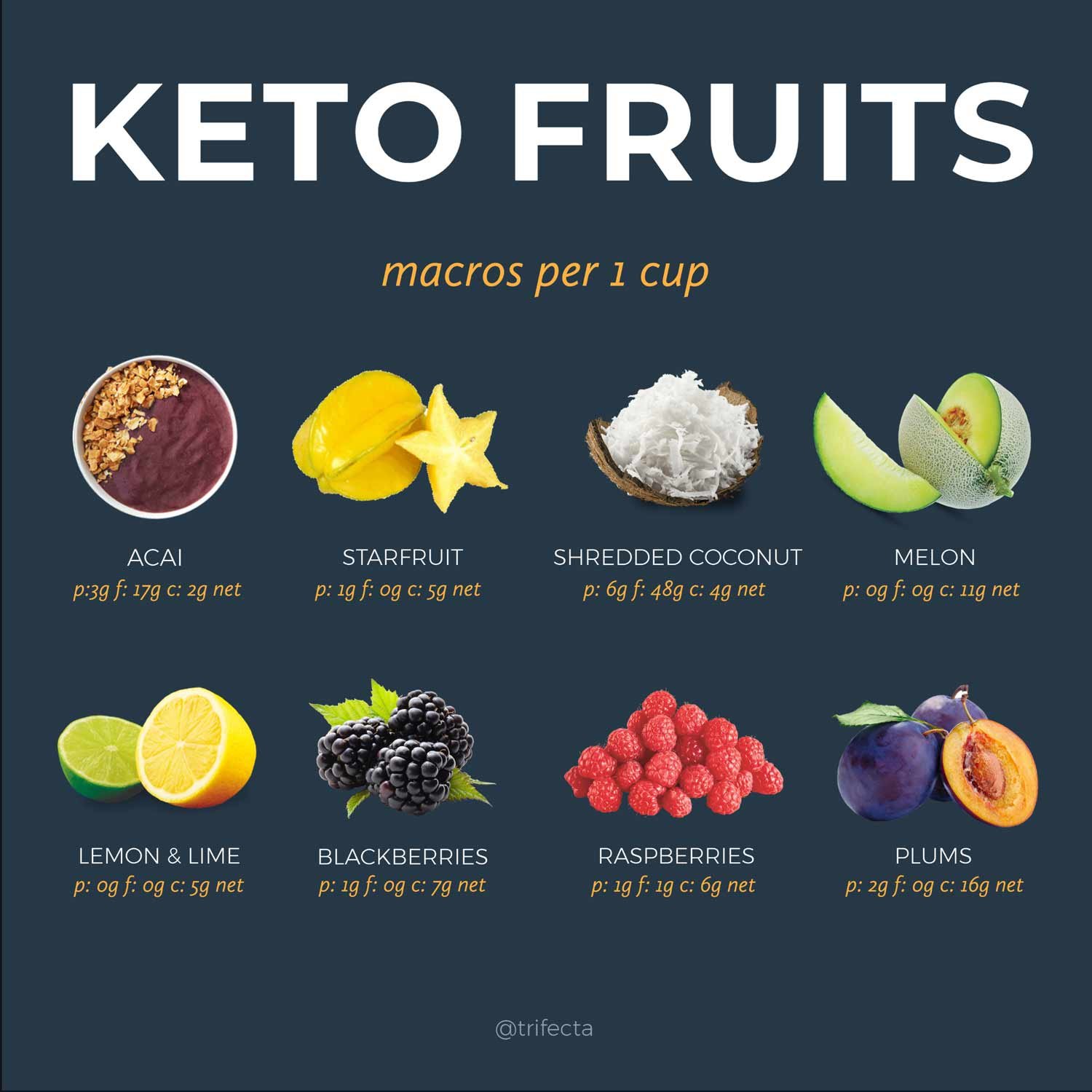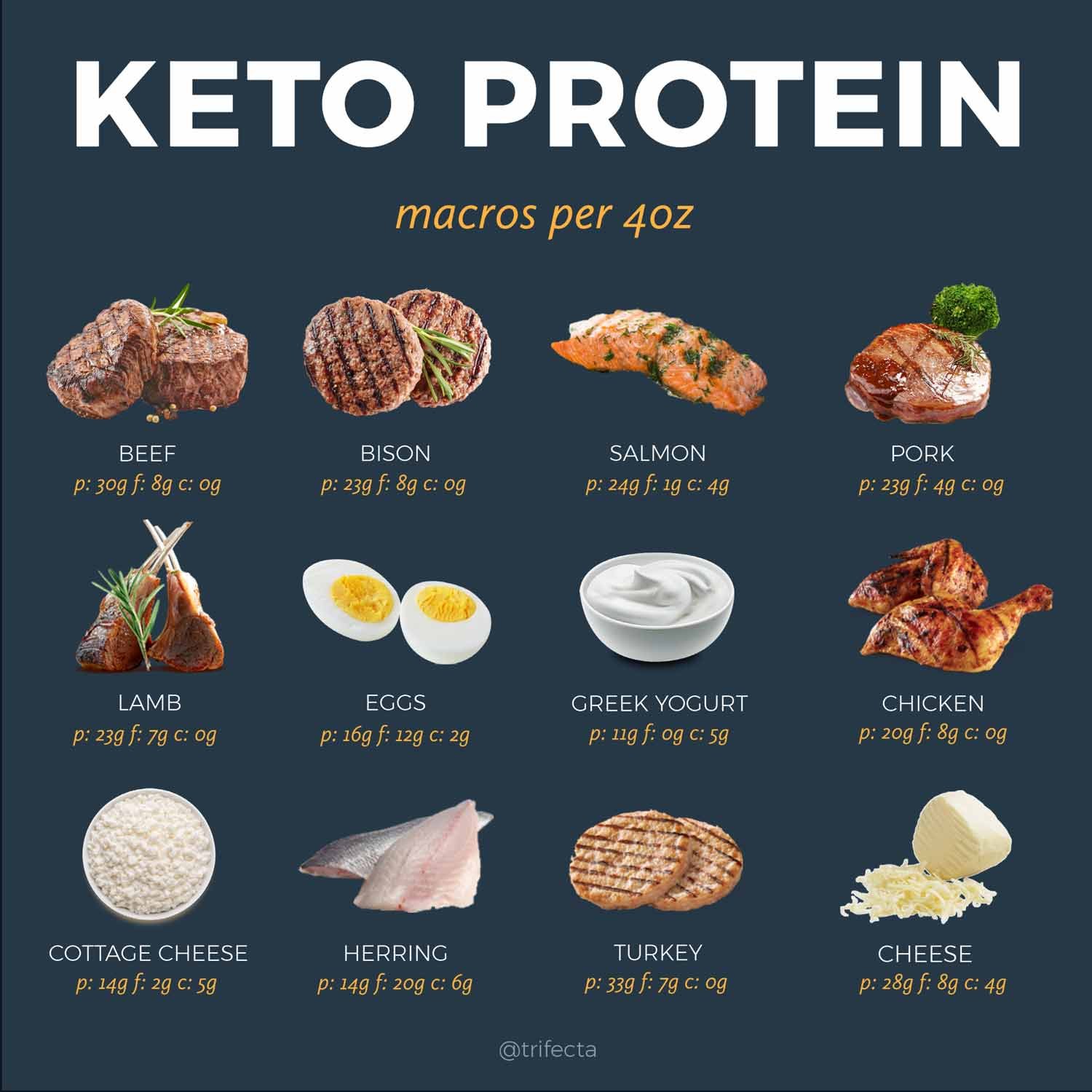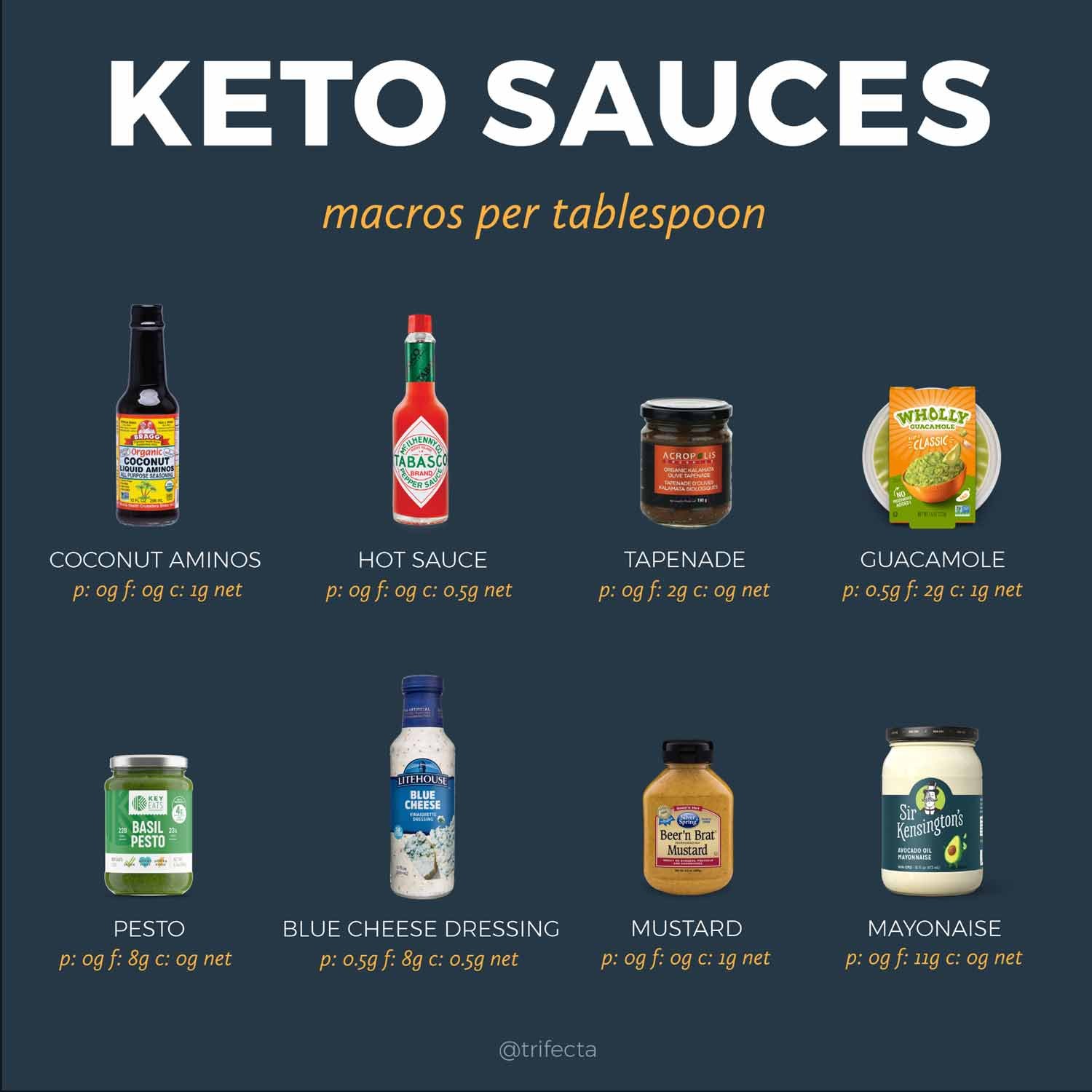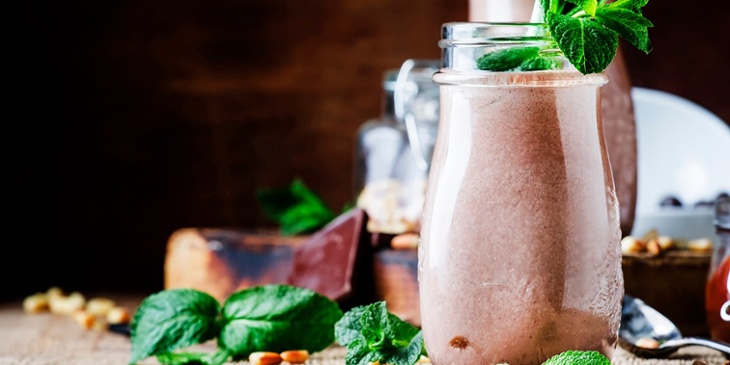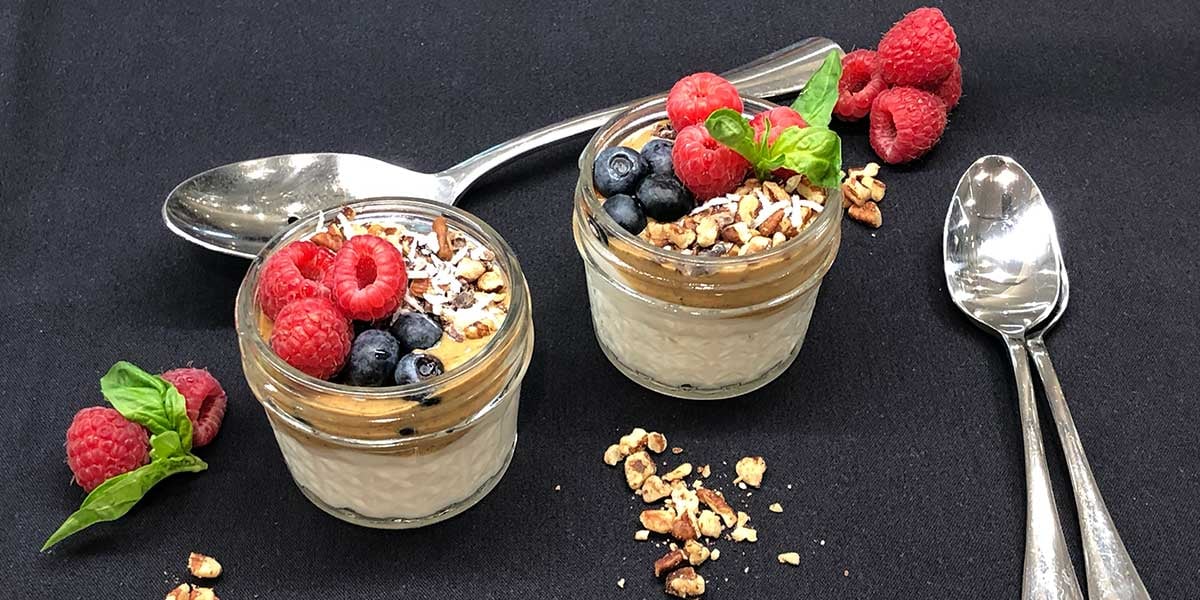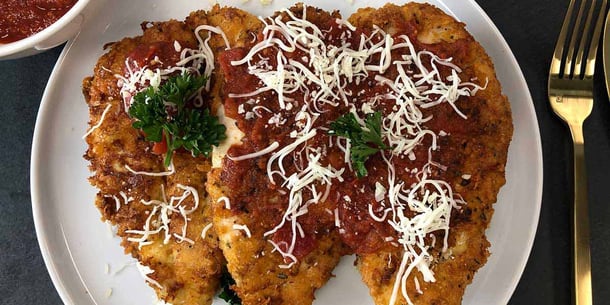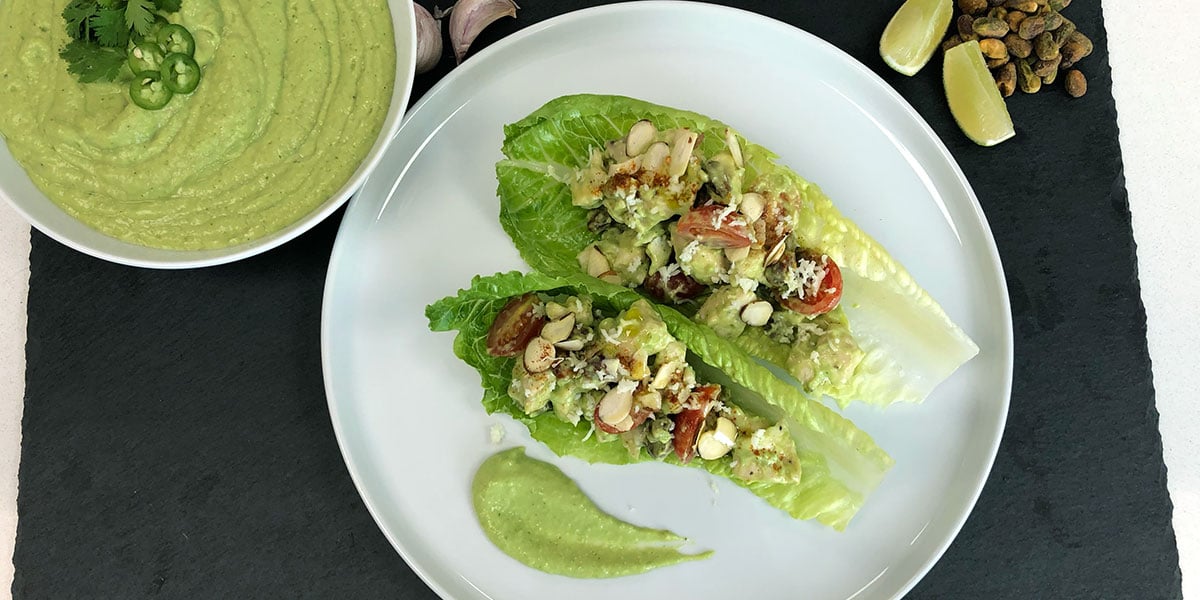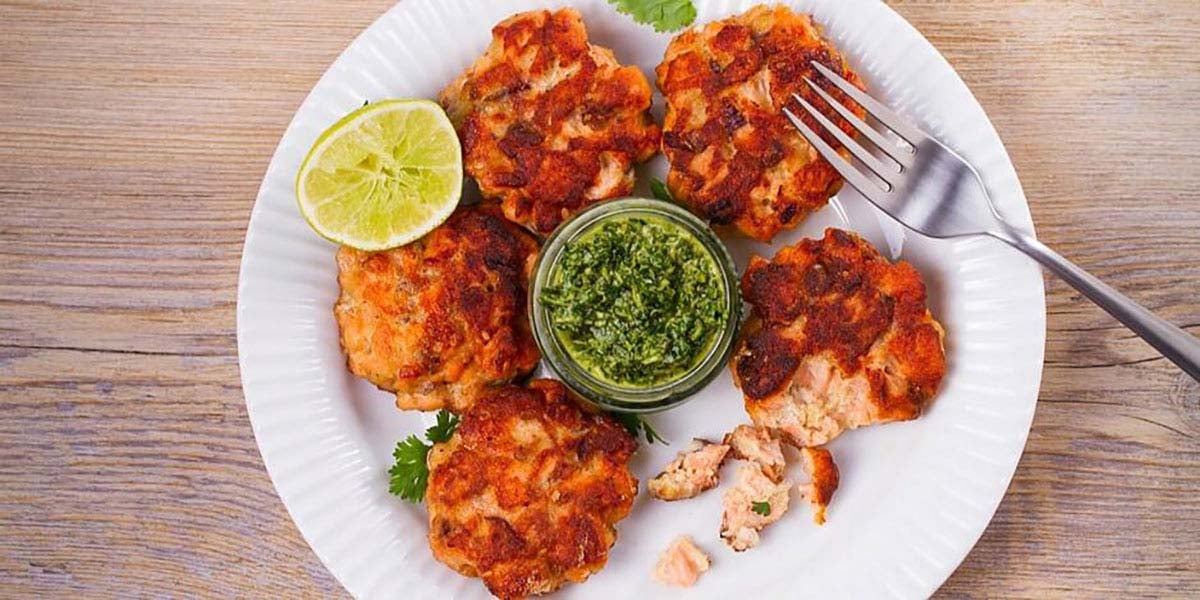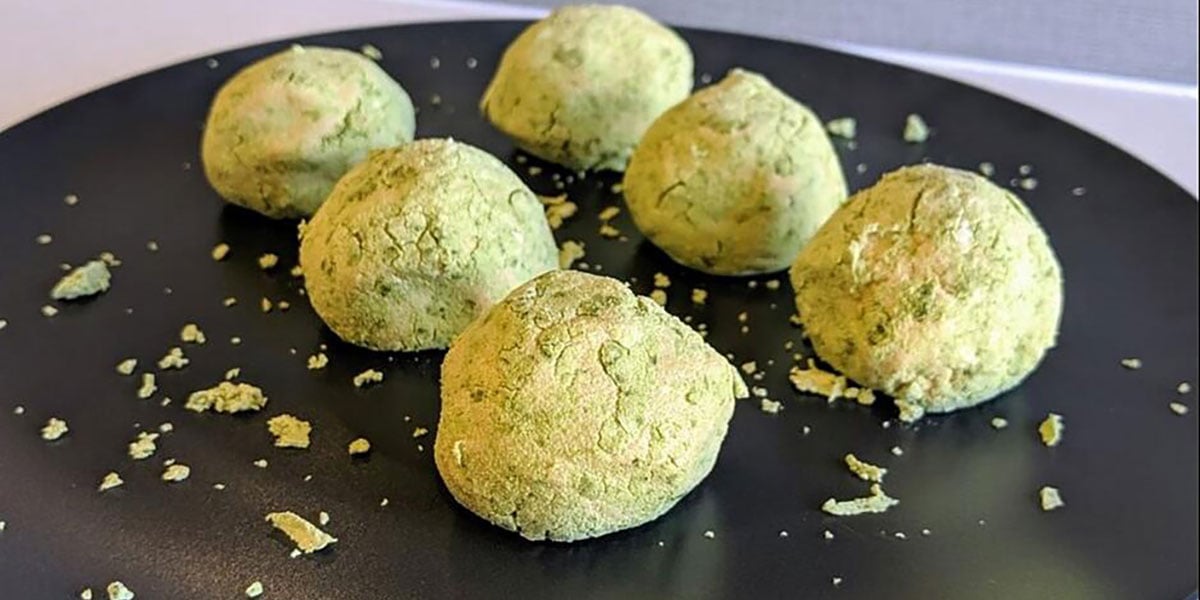Because keto is a macro-based diet, technically no foods are excluded - it just depends on how much you eat - specifically carbs! However, some options can certainly make or break your success on a ketogenic diet meal plan.
Even more so, getting the full benefits and achieving your health goals on keto goes beyond cutting carbs. Good nutrition and calorie control also matter. Thus, the best keto diet foods support your health and your ketogenic diet needs all at once.
So whether you are starting a ketogenic diet or just looking for trusted keto-friendly food options to add to your shopping list, here is your complete guide to the best and worst foods to eat on a keto diet and how to portion them for optimum results.
Take the prep out of your meal planning!
Your Complete Keto Diet Food List Guides
The Best Keto Foods to Eat List
- Healthy Keto Fat List
- Low Sugar Fruit List
- Low Carb Vegetable List
- Keto Protein List
- Keto Sweetener List
- Keto Condiments and Sauces List
- Keto Drinks List
Top Foods and Drinks to Avoid List
Building Your Ultimate Keto Meal Plan
- What Happens if You Eat High-Carb or Non-Keto Foods?
- Tips for Building a Healthy Keto Meal Plan
- Keto Recipes to Make
Printable Keto Food List (PDF)
While you’re here, download this free comprehensive keto food list pdf to get started. It's the ultimate guide to hundreds of keto-approved food options, complete with total net carbs for every food.
What Can You Eat on a Keto Diet?
Keto is a macro-based low-carb diet, meaning no food items are excluded as long as you hit your daily keto macronutrient goals. Of course, certain food items can make this harder or easier. Additionally, the quality of these food choices can impact your overall health and ability to lose weight on this meal plan (1).
The Keto Food Pyramid
Similar to phase one of the Atkins diet, the ketogenic diet is a high-fat and very low-carb eating plan - with total carbs commonly restricted to less than 20 grams of carbs a day (2).
Unlike traditional American diets where the bulk of calories typically come from carb-based foods like grains, potatoes, beans, and legumes, a keto food pyramid flips this on its head so the majority of your calories come from high-fat food choices with little to no carb-containing foods at the top.
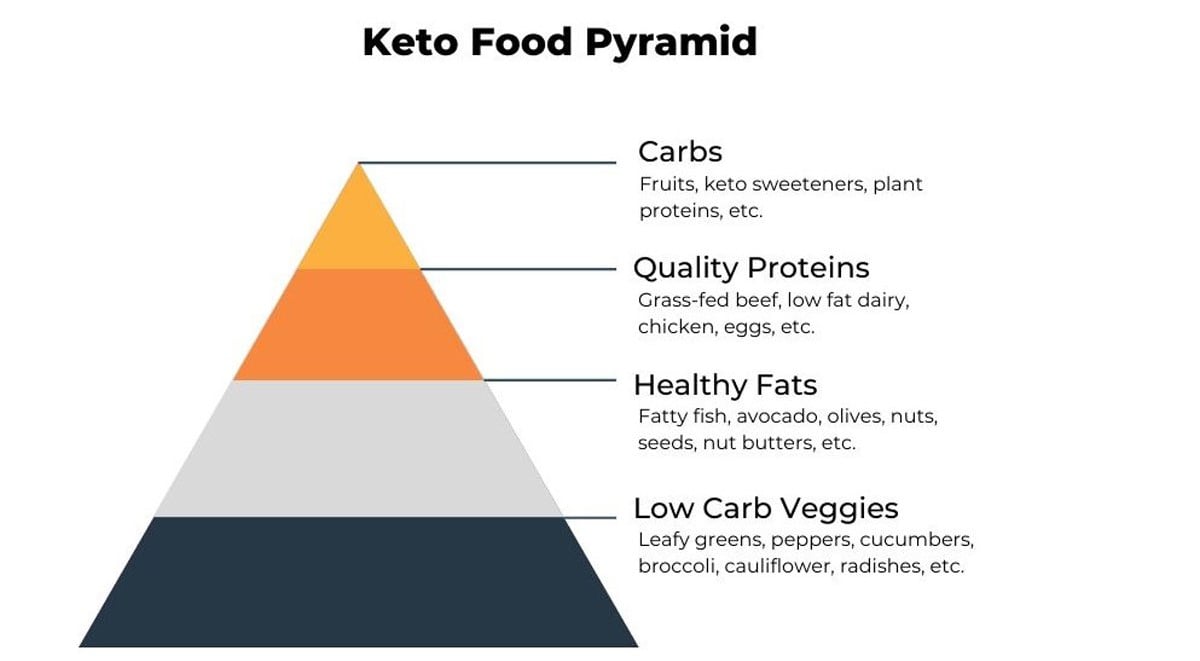
The goal of a ketogenic diet is to restrict carbs to such a low level that your body is forced to use more fats as a source of fuel, through a metabolic state called ketosis.
However, cutting carbs and increasing fat intake is only part of the equation. Switching up your food choices alone won't result in weight loss - eating a calorie-controlled diet is still crucial to your success (3).
How to Portion Keto Foods for Success
Learning exactly how much protein, carbs, and fat you need on a ketogenic diet is the first step to building your perfect menu. Knowing your exact macro needs will not only help you achieve ketosis but can also help you control your energy intake to support your fitness goals.
Use an online keto macro calculator to quickly estimate your nutrition needs. Once you know your macro goals, all you need to do is choose the best keto-friendly foods to eat every day that fit these macros.
Once you understand exactly how much protein, fat, and carbs you should eat, the next step is learning what serving size of each food is appropriate for you. This can take a bit of practice, but tracking your daily food consumption is a great way to learn.
Tracking your daily food intake on keto is key to hitting your daily nutrition goals and getting the most out of your meals.
The Importance of High-Fiber Foods When Cutting Carbs
As you learn to count carbs and balance your ketogenic diet macros, understanding the role of net carbs can make your life so much easier.
There are many types of carbohydrates in food and not all of them impact your blood sugar the same way. Fiber, in particular, is a type of carb that is not easily digested or absorbed and tends to have little, to no effect on blood glucose. Thus, many will subtract fiber content from their total carbs consumed to get what's called a "net carb count".
Fiber extracts are also commonly used to create no carb breads and other keto diet substitutes you can find in the market.
This allows you to more easily stay below your carb threshold and can provide various health benefits. not only is fiber associated with better heart health and digestion, but it also tends to be packaged in many naturally nutritious foods.
Grab your list of high-fiber foods!
How to Shop for Keto-Approved Foods
The easiest way to tell if something fits into your ketogenic diet is by checking the nutrition label. For packaged foods, check the nutrition facts for the serving size, calories, and macros, and keep an eye out for key nutrients - is this product a good source of any essential vitamins and minerals? Is it high in sodium?
Remember to look for net carb counts not just total carbs!
Check the ingredient label too! This will tell you exactly what's in the food and where your calories are coming from.
You can also opt for more nutrient-dense, whole foods that help you control your sugar intake, support good health and get you results faster on a keto diet. Nutrient-dense foods are foods low in calories that are also a good source or excellent source of essential nutrients like protein, fiber, vitamins, and minerals.
While many fresh food options don’t have a nutrition label, you can use a nutrition tracking app that has a searchable database to make sure you are getting healthy options that are low in carbs and a good source of nutrition.
The Trifecta app allows you to search over 6 million fresh and packaged foods to get accurate nutritional information in seconds!
The Best Keto Foods to Eat
The best ketogenic diet foods to eat are low in carbs and high in nutrition - helping you stick to your keto carb goals and supporting good health overall.
Here is your keto-approved food list for some of the top low-carb whole foods to add to your grocery list.
Healthy Keto Fats List
Fat comes from both animal and plant-based sources and can be found in whole food or as an extraction, such as oil and butter.
Animal fat is a source of saturated fat that is less desirable due to its association with increased blood cholesterol.
Thus the best keto fats are unsaturated fats that provide benefits to heart health, brain health, and improved mood. Plant-based foods, along with some high-fat fish, seafood, and whole eggs tend to be the best source of healthy fats to eat.
However, plants are also commonly a source of carbohydrates, so it can be a challenge to find choices high in healthy fat while also low in carb count. This is where net carb counts come into play.
Many quality fats, like nuts, seeds, and avocado, may seem high carb at first glance but once you subtract fiber, their total net carbs is well within reason.
Here's your list of the best plant-based sources of fat for keto:
- Nuts
- Seeds
- Nut butters
- Tahini
- Avocado
- Olives
- Cacao and unsweetened dark chocolate
- Coconut oil
- Olive oil
- Plant-based oils
Low Sugar Fruits List
While fruit is typically referred to as a high-carb food, it is entirely possible to enjoy some types of fruit without going over your daily carb limit. Especially when you are counting net carbs. The trick is to use portion control and include small amounts of low-sugar options.
Fruit is a great source of vitamin C, potassium, and fiber!
Fruit can vary on the scale of less sweet to more sweet, depending on its sugar content. Typically the lowest-sugar fruits tend to be melons, berries, and some tropical fruits.
Here's your list of low-carb fruits to try:
- Unsweetened Açaí Puree
- Starfruit
- Shredded Coconut
- Lemon
- Lime
- Blackberries
- Plums
- Raspberries
- Strawberries
- Melon
Low Carb Vegetable List
Vegetables are some of the most nutritious foods on the planet and should make up a large portion of your keto meals.
Because of their low-calorie count, vegetables also tend to be an easy way to eat a larger portion of food without going over your calorie or carb limits! Additionally, their high fiber and nutrient content provide numerous health and nutrition benefits.
However, like many plant-based options, certain veggies can contain high amounts of carbohydrates. The key is to choose more non-starchy vegetables that are low in calories and high in water content and nutrition. Luckily, this is almost all vegetables.
Here is your list of the most popular low-carb veggies for keto:
- Leafy greens
- Radishes
- Cauliflower
- Broccoli
- Tomato
- Eggplant
- Zucchini
- Cucumber
- Peppers
- Green beans
- Celery
- Bok choy
- Jicama
- Mushrooms
- Artichokes
- Cabbage
- Beets
- Onions
- Carrots
- All fresh herbs
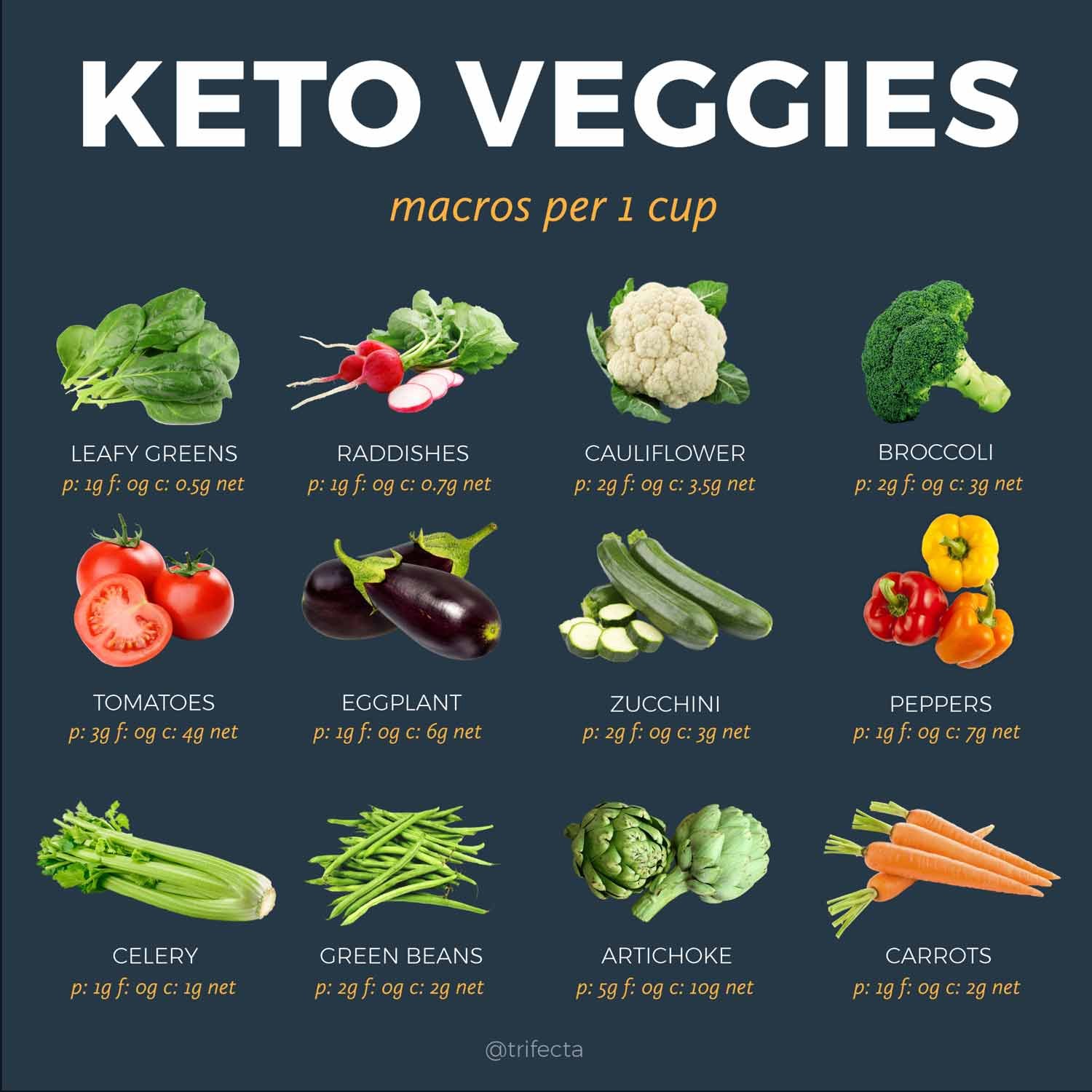
Keto Proteins List
Although some argue that eating too much protein on keto can inhibit ketosis, there is no evidence to support this claim. In fact, evidence suggests that high protein diets likely support weight loss by decreasing hunger and protecting lean muscle mass.
Fatty fish and seafood tend to be some of the top protein options for a ketogenic lifestyle because they provide a source of healthy omega-3 fat and quality protein.
Plant proteins can often be high in carbohydrates, so animal proteins tend to be a better option for keto dieters. However, high-fat animal products can also provide a lot of saturated fat which is thought to negatively impact heart disease risk (4).
Opting for more naturally lean meats like grass-fed red meat, free-range poultry, and low-fat dairy products can still help you get your protein filled with less saturated fat intake.
The best keto proteins include:
- Cage-free eggs
- Fatty fish like salmon, mackerel, and herring
- Whitefish
- Grass-fed bison, beef, goat, and lamb
- Lean pork
- Free-range chicken
- Turkey
- Quail, ostrich, and other poultry
- Shellfish
- Low-fat cottage cheese, cheese, and unsweetened yogurt
Other Keto-Approved Ingredients
Cooking most of your meals at home is one of the easiest ways to control your ingredients and portion sizes, ensuring you are sticking to your ketogenic diet goals. But you'll want to understand which sauces, seasonings, and added ingredients fit your keto lifestyle.
There is a growing abundance of keto-approved sauces, sweeteners, mixes, and low-carb substitutes available to make preparing your own carb-conscious meals easier than ever.
Here are some of the most popular keto ingredients to look for that can help curb cravings and won't mess with your overall nutrition.
Keto Sweeteners List
Intense sugar cravings can be a common side effect for new keto eaters, so finding sugar substitutes that satisfy your sweet tooth without impacting blood sugar levels can help.
Keto-friendly sweeteners like sugar alcohols and artificial sweeteners are great options for this. Specific sugar-free sweeteners to look for include:
- Erythritol
- Monk Fruit
- Stevia
- Splenda
- Other artificial sweeteners
Keto Condiments and Sauce List
When it comes to sauces and condiments, you'll want to make sure you account for any added calories or fat.
While many high-fat sauces, like ranch dressing and mayonnaise, are keto-approved, they can also pack a lot of calories in a small serving, making losing weight a bit more challenging if you aren't paying attention to what you're eating.
On the other hand, adding some healthy fat to a lean meal can support your ketogenic diet by helping to keep you satisfied and potentially assist with getting into and staying in ketosis.
It's a balancing act and depends on what works best for your health goals. Use sauces and condiments for added flavor, just be sure to double-check the nutrition label and track what you're consuming.
- Mayonnaise
- Mustard
- Ketchup (no sugar added)
- Coconut aminos
- Soy sauce
- Guacamole
- Tapenade
- Hot Sauce
- Sriracha
- Alfredo sauce
- Pesto
- Sugar-free salad dressings
- Tzatziki
- Ranch dressing
- Blue cheese dressing
- Hollandaise
- Other high-fat low carb sauces
You can also easily make your own high fat, home made keto sauces using simple ingredients like oils, nuts, herbs, and vinegars.
What About Keto Beverages?
Most commercial beverages are loaded with added sugar or made from juice blends that are naturally higher in carbs. When looking at drinks that fit into a keto plan, it's always best to check the nutrition facts label.
But that doesn't mean you have to just settle for plain old water all the time. There are many sugar-free and artificially sweetened beverage options available to help keep you hydrated and on track.
Here are some go-to options to reach for:
Keto Drinks List
- Water
- Sparkling water/club soda
- Tea (unsweetened)
- Coffee (unsweetened)
- Unsweetened plant-based milk
- Flavored water with no added sugar
- Wheat grass or other green vegetable juices made without fruit
- Sugar-free sports drinks
- Diet soda
- Diet energy drinks
Top Food and Drinks to Avoid on Keto
Since a keto meal plan is all about hitting your macros, just about any food is allowed on this eating plan. However, certain high-sugar foods can make sticking to your nutrition goals a real challenge.
Additionally, cutting back on heavily processed foods, saturated fats, trans fats, and empty calories can support your overall health, well-being, and how successful you are.
Here are the top foods to steer clear of to support your macro and health goals.
High Carb Food List
Many carb sources will easily put you over your daily limit in a single serving or less. You'll want to cut back or avoid the following foods/types of foods altogether.
- All grains, pasta, and bread
- Beans, lentils, and other legumes
- Corn
- Potatoes
- Most fresh and dried fruits
- Juice and soda
- Milk
- Desserts
- Pastries
- Pizza
- Breaded meats and other breaded fried foods
- Maple syrup, honey, agave, and table sugar
Processed Keto Food Items List
Eating a 100% whole food diet takes some serious dedication and isn't necessarily feasible or realistic for most people - at some point, you are going to consume packaged or prepared foods.
There are a lot of high-fat and high-calorie foods marketed as keto-approved, but not all of these options are good for your overall health. Many keto-packaged foods can contain significantly more calories than their higher-carb counterpart and very little nutritional value, which can put you at a disadvantage.
In other words, just because that ice cream is keto, doesn't mean it's going to help you lose weight. Especially if it's twice the calories of traditional ice cream!
While you don’t have to avoid this processed keto food altogether, it should not make up the bulk of your food intake. And you should always pay attention to the ingredients and nutrition they bring to the table.
Common processed keto food options include:
- Ultra-processed packaged foods
- Keto desserts
- Keto fast food
- Processed meat
- Processed cheese
What About Alcohol?
Yes, you can enjoy alcohol in moderation while following a ketogenic diet. However, the amount you consume and the types of drinks you choose can make a difference when it comes to your health and weight loss goals.
It is not typically recommended to consume high amounts of alcohol when looking to cut calories and lose weight, so alcohol would fall under the "food and drinks to avoid" list, even though some of it is technically ketogenic diet approved.
Keto Alcohol List
Here are some of the most popular low-carb alcoholic options that won't mess with your carb counts:
- Vodka
- Gin
- Rum
- Tequila
- Brandy
- Scotch
- Bourbon
- Light beers
- Champagne
- Some dry wine
- Alcoholic seltzers
What Happens if I Eat High-Carb or Non-Keto Foods?
Because losing weight on a ketogenic diet still requires calorie control, straying from your keto diet food list on the occasion is not going to destroy your progress, as long as you keep your overall nutrition goals in mind.
Where your keto macros (specifically how many grams of carbs you eat each day) really start to matter is your ability to get into and stay in ketosis. The amount of carbs you eat directly impacts your ability to use ketones as a source of fuel. When you go over your carbs, you can cause your body to use these carbs as your source of energy - putting a pause on your fat-burning mode.
Of course, once you resume your low-carb keto diet plan, you can get back into ketosis pretty easily. And remember, while ketosis is thought to have some possible health benefits, it is not essential for better health or weight loss.
Because of this, it is possible to follow a modified or less restrictive keto diet and still see incredible results. Many will use these food lists as a guide or jumping-off place and still see success with keto.
Bottom Line
If you eat a high-carb meal or go over your carbs from time to time, don't sweat it. But if you find it hard to stick to a keto-approved food list consistently, you might want to reconsider whether or not low-carb dieting is right for you.
Tips for a Healthy Keto Meal Plan
Sticking to a trusted keto diet food list is only one factor to consider. Keto is actually a fairly challenging dietary approach to master. But with a little bit of nutrition knowledge and the right tools, you can achieve a nutritious, balanced keto diet that helps you feel good and get results.
One of the hardest parts of keto is keeping calories controlled while following a high-fat diet. Fat provides twice as many calories per gram as protein or carbs, so your portion sizes may actually be smaller on a keto-eating plan.
In addition, it can be hard to get enough of certain nutrients commonly found in higher-carb options - like vitamin D from milk and B vitamins from grains (5).
Here are a few tips you can use to make starting keto even easier:
- Choose more nutrient-dense foods and balance higher fat options with large portions of non-starchy vegetables. This is a great way to ensure you get more nutrition and stay on track without going hungry.
- Learn how to plan and prep your own food for the week. Meal prepping can be a huge time saver and helps ensure you are always hitting your keto macros - since you control the menu and the portions.
- Track your calories and your nutrition intake. If you are noticing a lack of certain nutrients, consider working with a dietitian for recommendations or taking a multivitamin supplement each day.
- Hit the easy button and order keto meal delivery. Trifecta’s keto meal plan does all the hard work for you, with nutritious, macro-balanced keto meals delivered right to your house.
Keto Recipes to Make
To help you stick to your keto meal plan and get the nutrition your body needs, here are some easy low-carb keto recipes to make:
Keto Diet Breakfast Recipes
Finding healthy low-carb breakfast choices can feel a bit tricky. You have to think beyond your typical eggs and bacon and make sure you are incorporating more nutrition in the morning.
This low-carb, high-protein shake is loaded with flavor and healthy fats, making it a great staple to add.
Or try this low-sugar yogurt parfait.
More low carb breakfast recipes to make this week.
Keto Diet Lunch and Dinner Recipes
When it comes to lunch and dinner, aim for plenty of quality protein foods and non-starchy veggies to keep you feeling satisfied, and then add healthy fats to support ketosis and provide massive flavor.
Curb cravings and hit your macro goals with this delicious low-carb chicken parm recipe.
Make your standard lettuce wraps more exciting and high in protein with these chicken guacatillo wraps.
Indulge without the carbs when you make this decadent cauliflower mac and cheese recipe. 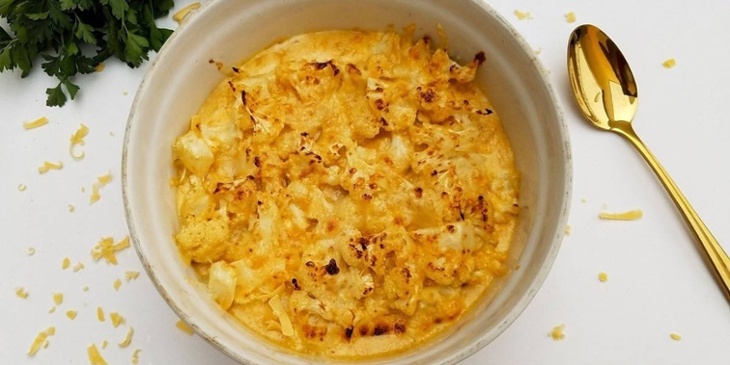
Get plenty of good fat and quality protein with these tasty salmon cakes, served with a zesty chimichurri sauce.
Keto Diet Snacks
You can keep your snacks simple with staple choices like plain almonds, string cheese, or jerky, or take things up a notch with these protein-packed matcha fat bombs.
Get Low Carb Meal Plans Delivered to Your Door
Want to make sure you stick to your low-carb diet goals? Get ready to eat low-carb meal plans like keto or paleo delivered right to your door. Enjoy keto meals with less than 10 grams of total net carbs per dish, or high protein paleo meals made with healthy whole foods.



